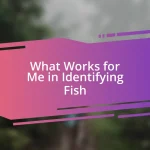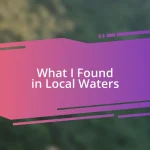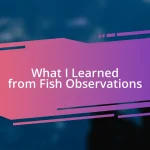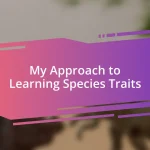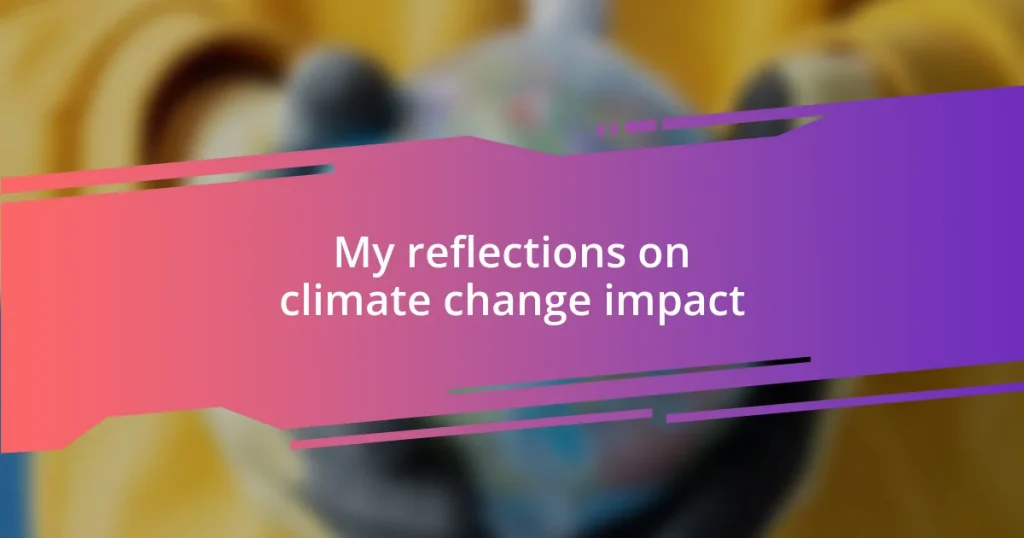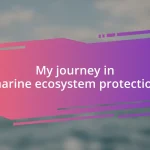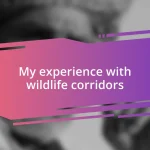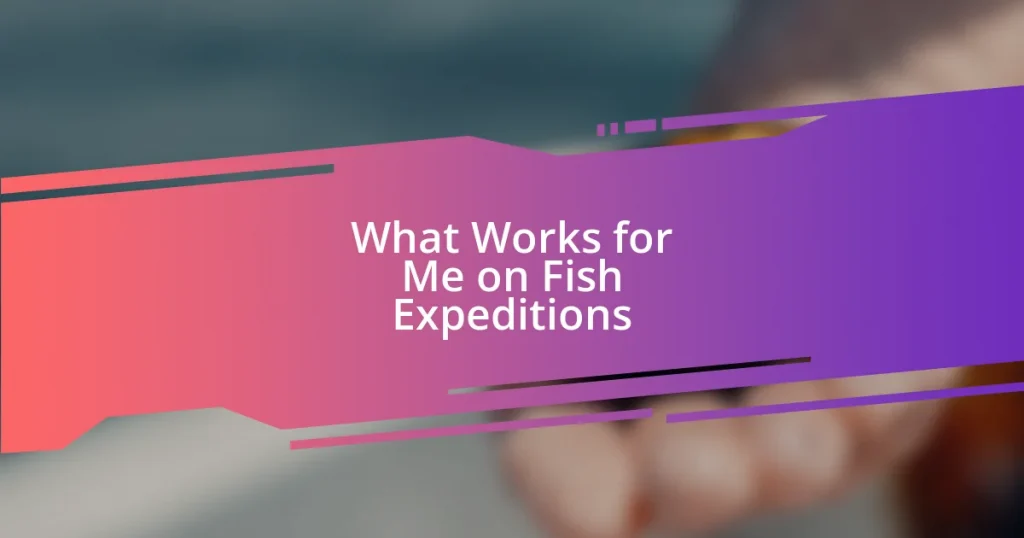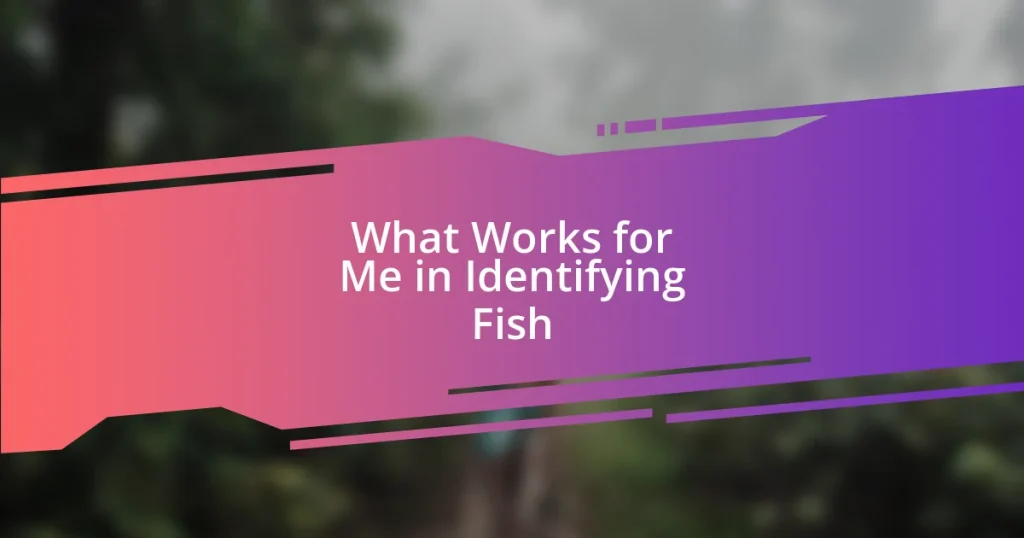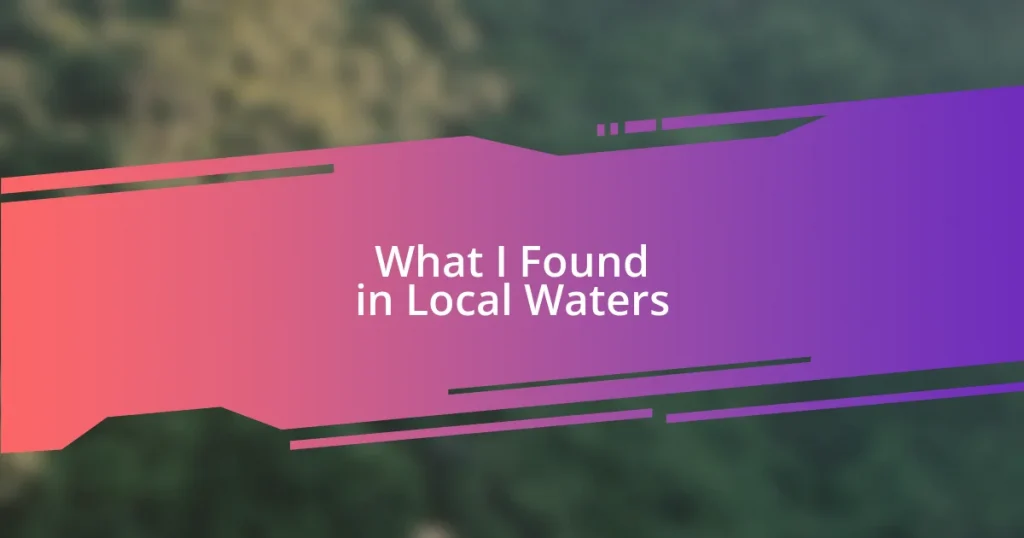Key takeaways:
- The author reflects on personal experiences with climate change, highlighting emotional and ecological impacts, such as witnessing droughts, wildfires, and shifts in local weather patterns.
- Community actions, including clean-up drives and gardening initiatives, foster a sense of responsibility and solidarity, demonstrating the power of collective efforts in combating environmental issues.
- Individual contributions to combating climate change, such as reducing plastic use and increasing energy efficiency, can create meaningful change, emphasizing the importance of personal accountability and community dialogue.
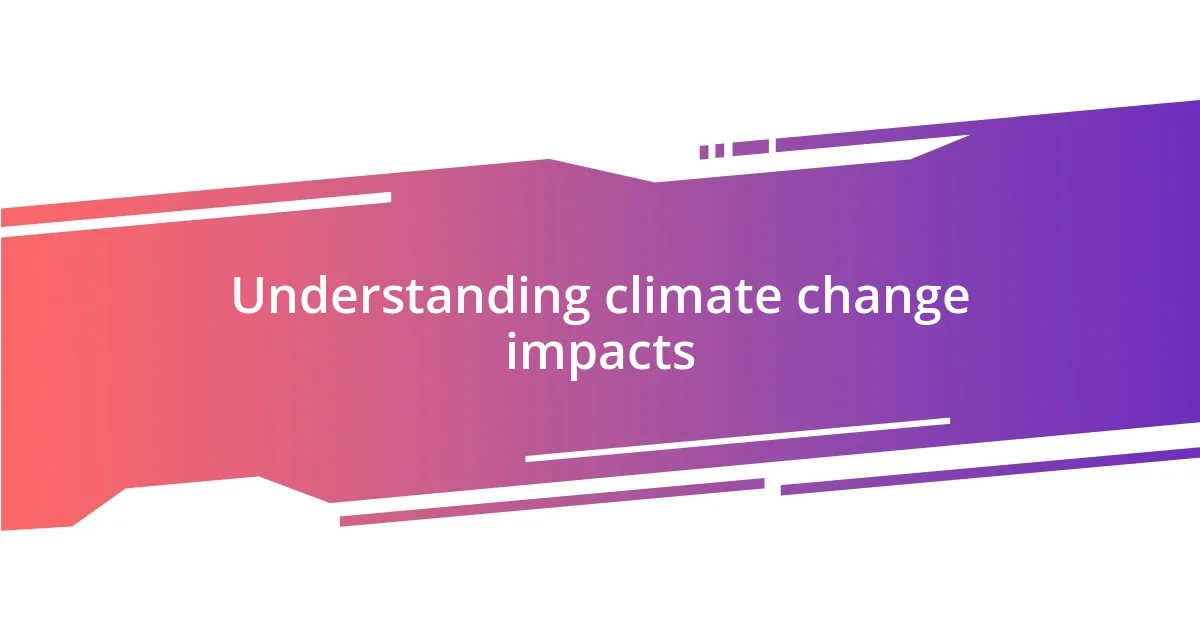
Understanding climate change impacts
Understanding the impacts of climate change can often feel overwhelming. I remember a day when my community organized a beach cleanup, but instead of just trash, we found debris that had washed ashore from increasingly severe storms. It hit me then that these weather patterns are not just statistics; they affect real lives, including ours.
Have you ever experienced a season that felt dramatically different from the ones you grew up with? As I reflect on the last few years, I realize how unpredictable weather has become—one moment, we’re battling extreme heat, and the next, unexpected floods. These shifts aren’t mere inconveniences; they can devastate crops, disrupt livelihoods, and challenge how we view our local ecosystems.
Additionally, the effects of climate change ripple through our mental health. I recall speaking with a mentor who shared feelings of anxiety regarding the future—a sentiment that echoes across generations. This emotional burden underscores just how interconnected we are with the environment; understanding these impacts means acknowledging our collective vulnerabilities and resilience in facing an uncertain future.
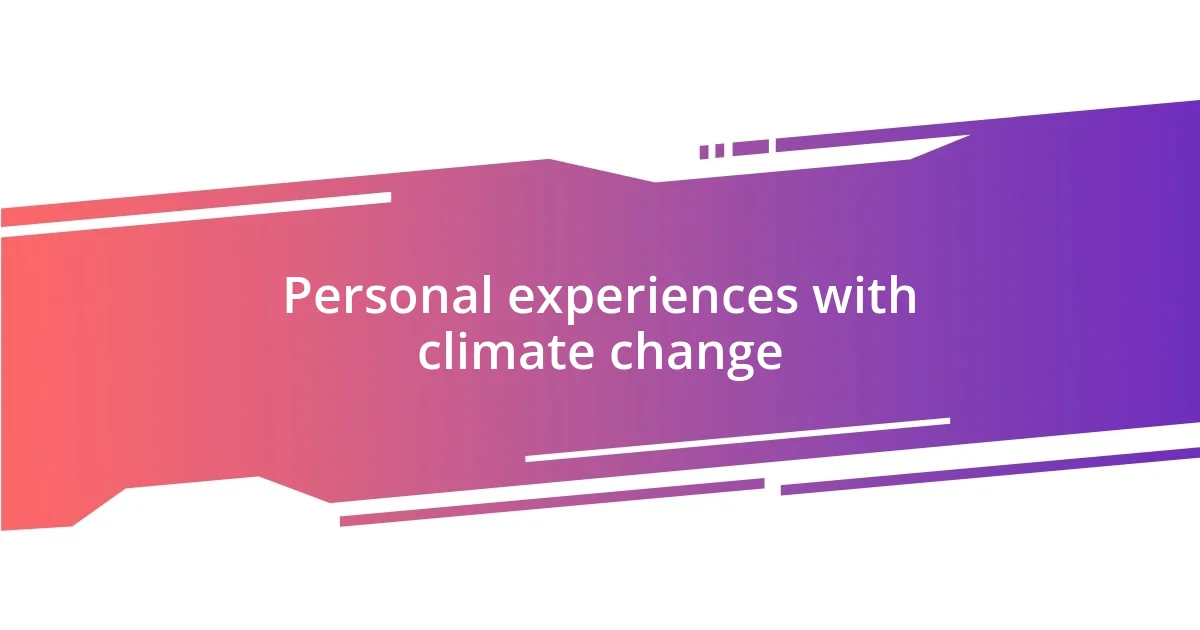
Personal experiences with climate change
I remember last summer when my family and I went hiking in the mountains, a place I’ve treasured since childhood. We were met with a disheartening sight: once-lush trails were now parched and brown. It made me reflect on how climate change alters not just the landscape, but also our cherished experiences and memories tied to these natural wonders.
Another vivid memory that comes to mind is when a wildfire broke out near my hometown. The once-clear skies turned an eerie orange, and the smell of smoke hung heavily in the air for days. As I sat inside, I felt a mixture of fear and helplessness, realizing that my community was at the mercy of flames fueled by rising temperatures. It was a stark reminder of how quickly things can change, leaving us to grapple with the aftermath.
Participating in a community garden initiative was another poignant experience for me. As we planted seeds, we’d often discuss how strange it was to see certain plants thriving while others wilted in the extreme heat. This eye-opening contrast not only reinforced the need for adaptation but also highlighted our shared responsibility. Moments like these illustrate just how deeply intertwined our lives are with the shifting climate around us.
| Experience | Description |
|---|---|
| Hiking in the Mountains | Trekking through dry trails that were once vibrant and green, evoking feelings of nostalgia and loss. |
| Wildfire Near Hometown | Witnessing orange skies and smelling smoke, confronting the fear and helplessness of climate-induced disasters. |
| Community Gardening | Planting seeds while discussing plant resilience, emphasizing the shared impact of climate change on our local ecology. |
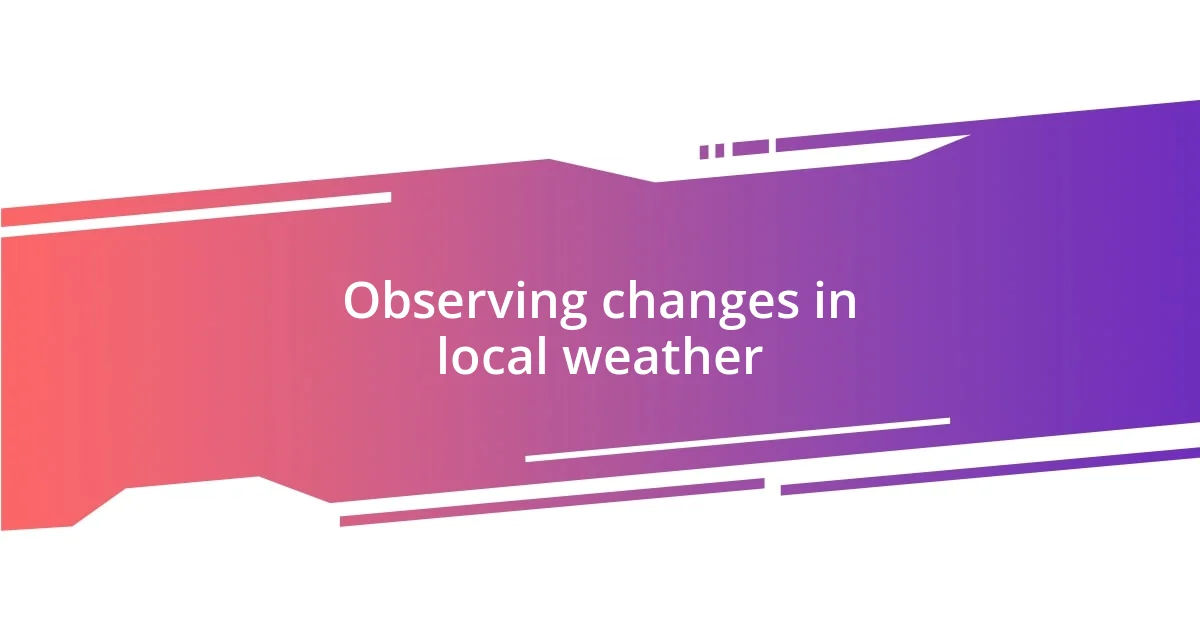
Observing changes in local weather
I’ve started noticing how our local weather patterns seem to have a mind of their own lately. Just last spring, we experienced an unusual frost that caught many of us off guard, damaging early blossoms that we had eagerly awaited. It felt like nature was playing tricks on us. Observing these fluctuations, I can’t shake off the feeling that something deeper is happening, making me question how to adapt and prepare for what may come.
- Unpredictable Storms: It’s not just the temperature shifts that concern me. Last winter, we faced torrential rains that felt almost biblical. The streets transformed into rivers, and I could see firsthand how quickly our environment can change.
- Extended Heat Waves: I remember sweltering days that seemed to stretch on forever. I found myself seeking shade, recalling summers of my youth that were much milder.
- Unexpected Cold Snaps: The past few autumns brought sudden drops in temperature. One moment, it was pleasant sweater weather; the next, I was shivering and rummaging for my winter coat.
Every change serves as a reminder that the signs are all around us, pushing me to rethink how I engage with the world.
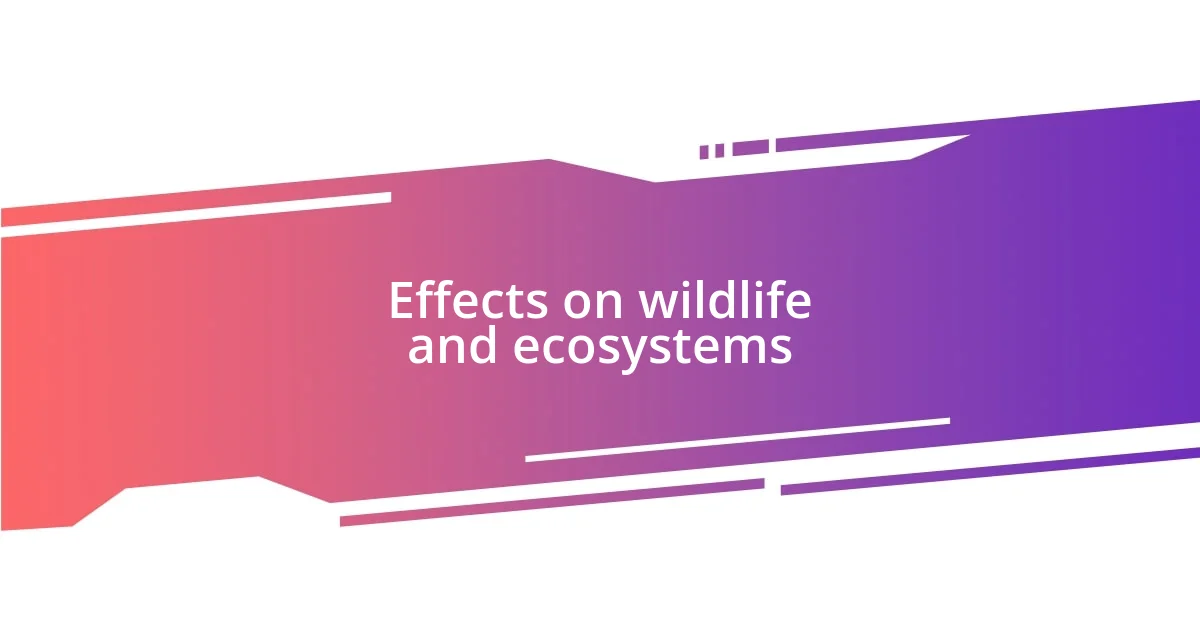
Effects on wildlife and ecosystems
Wildlife is facing unprecedented challenges due to climate change, and I often wonder how many species will struggle to adapt to their rapidly shifting environments. Just the other day, I spotted a group of deer in a local park that seemed unusually thin. It made me think about the food sources they rely on, which are being disrupted by changing temperatures and habitat loss. How do you feel when you see animals that appear to be suffering? It hits close to home.
Ecosystems are equally affected; I recall visiting a coral reef during a recent vacation that had lost its vibrant colors, leaving ghostly white formations instead. This bleaching is a direct result of rising sea temperatures, which I now understand better than ever. It was heartbreaking to see marine life struggle for survival, reminding me that the fate of our oceans is intertwined with our own existence. What can we do to protect these delicate ecosystems? It’s a question that lingers in my mind.
I’m particularly struck by the impact on migratory birds; they seem to be arriving earlier in the spring but are met with fewer insects and blooms to sustain them. I remember sitting in my backyard, captivated by the sight of robins who looked confused and out of sync with their surroundings. This disorientation reflects a broader disruption, making me ponder: how much longer can these incredible creatures adapt before we witness irreversible consequences? It’s a sobering thought that prompts us to take action before it’s too late.
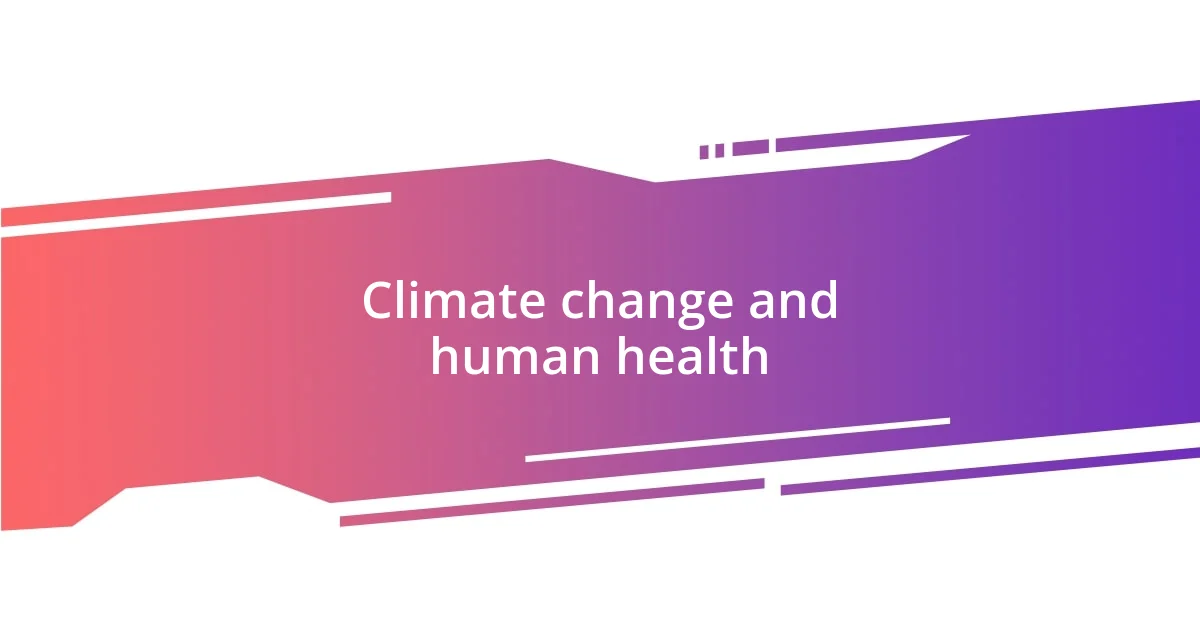
Climate change and human health
The relationship between climate change and human health is becoming increasingly evident to me. Recently, I read about how rising temperatures contribute to a surge in heat-related illnesses. I can’t help but recall the last summer when I saw some elderly neighbors struggle to cope with the heat, often sitting outside under a tree with fans trying to cool themselves. It made me wonder, how many people are we losing to something as simple as a heatwave?
Moreover, the spread of diseases is another concern that weighs on my mind. I remember discussing in a community meeting how the warmer climate is allowing mosquitoes to thrive, bringing diseases like West Nile virus closer to our homes. It seems surreal that a little insect could make such a significant impact on our health. This surge in vector-borne diseases makes me reflect on the importance of staying informed about our local health guidelines.
Mental health is also affected, and this is something I feel strongly about. There have been times when I felt overwhelmed by the relentless news regarding climate disasters and their toll on communities. It’s hard not to feel anxious or helpless. I often ask myself, how do we protect our mental well-being in the face of such daunting challenges? Finding connections with others and discussing our feelings seems crucial, revealing just how interconnected our emotional responses are to the climate crisis.
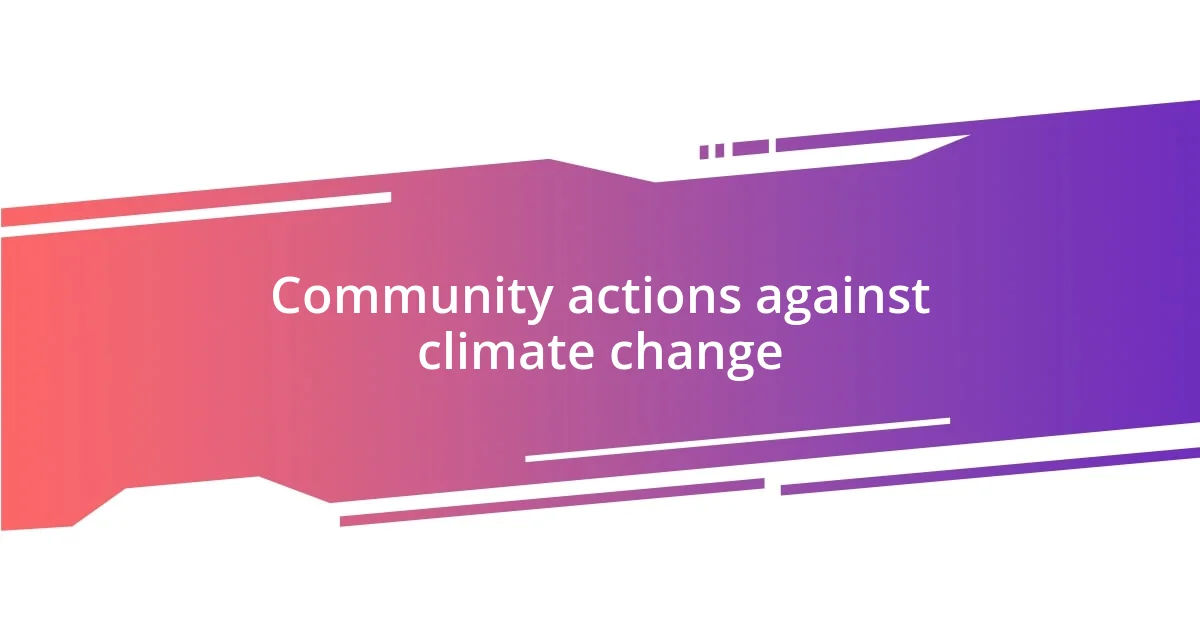
Community actions against climate change
One striking example of community action I’ve observed is local clean-up drives at beaches and parks. I remember joining a group of enthusiastic neighbors one Saturday morning, armed with trash bags and a determination to make a difference. As we worked together to clear plastic and debris from the shore, I felt a palpable sense of camaraderie and purpose, highlighting how collective efforts can mitigate the impact of pollution on our ecosystems.
In my town, I’ve seen the emergence of community gardens that not only promote sustainable practices but also foster a sense of responsibility towards the environment. Whenever I visit my friend’s garden, where residents collaborate to grow organic vegetables, I’m amazed by what a few dedicated hands can cultivate. It’s more than just food; it’s a lesson in resilience and community solidarity as we share tips and talk about how our choices affect our planet.
I’ve also been encouraged by the rise of local climate advocacy groups that gather to strategize and push for policy changes. At one meeting I attended, the energy in the room was infectious. People were passionate and hopeful, sharing ideas on how to advocate for renewable energy initiatives in our city. I couldn’t help but marvel at the potential impact of these grassroots efforts. Isn’t it inspiring to consider how one voice can spark a movement? Together, we can amplify our messages and create a ripple effect that leads to real, tangible changes.
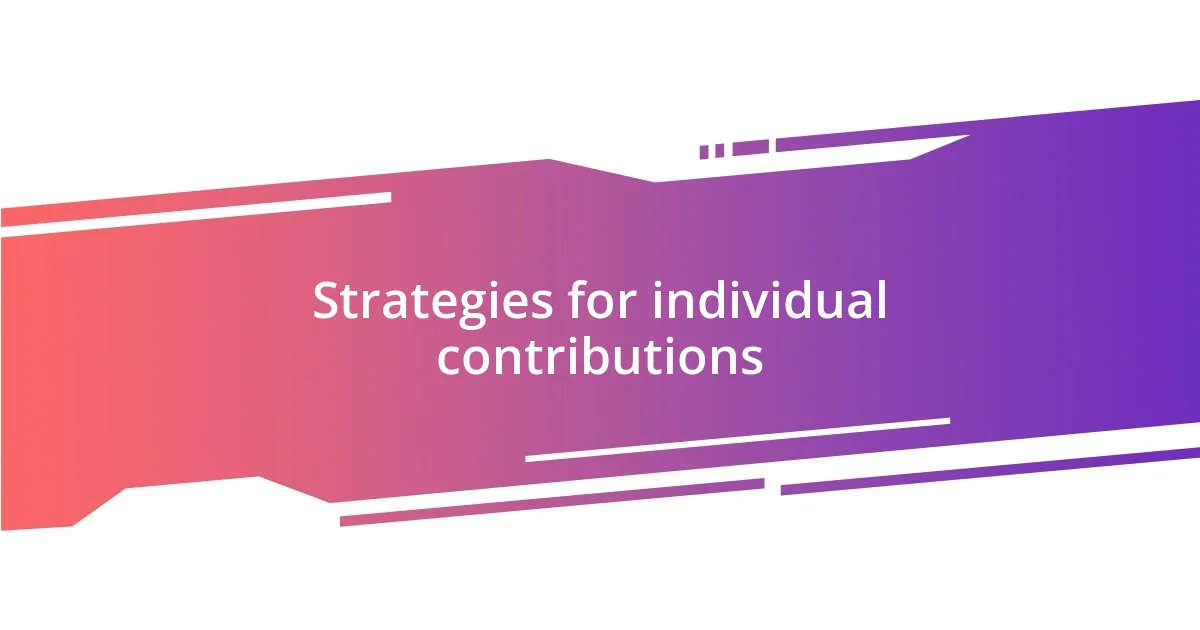
Strategies for individual contributions
Taking individual steps can greatly contribute to combating climate change, and I’ve found that even small actions can have a significant impact. For instance, I decided to reduce my plastic consumption by carrying a reusable shopping bag whenever I run errands. Every time I bypass those single-use plastic bags, I feel a sense of accomplishment, as if I’m doing my part for the planet, even if it’s just a tiny one. Have you ever thought about how your choices, big or small, can create a collective shift towards sustainability?
Moreover, I’ve become more conscious of my energy usage at home. After a bit of reflection, I realized that simply switching off lights when I leave a room adds up over time. I even invested in energy-efficient bulbs, and it’s not just about saving electricity—it’s also empowering to know I’m taking steps to lower my carbon footprint. It’s fascinating how a few minor adjustments can lead to a more mindful lifestyle and, in turn, contribute to a greater cause.
Additionally, I’ve taken the plunge into educating myself and others about climate change. One memorable evening, I hosted a small gathering with friends to discuss our environmental concerns. The conversations flowed effortlessly, and it was heartening to see everyone share ideas on sustainable practices. I discovered that engaging in these dialogues not only broadens our understanding but fosters a supportive community ready to make changes. It makes me wonder, how could conversations like these transform our neighborhoods into hubs of climate awareness?

